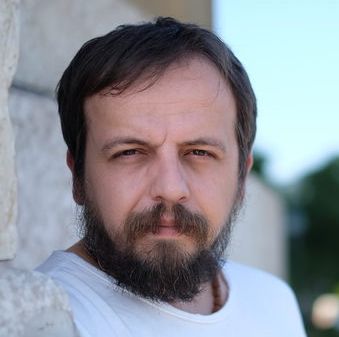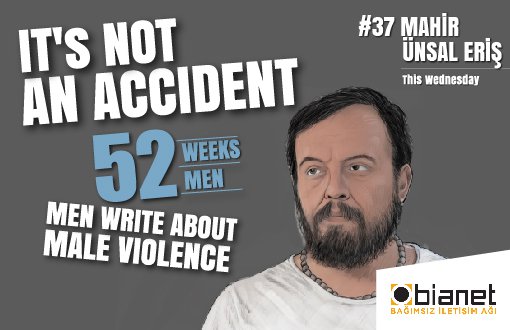Click to read the article in Turkish / Kurdish
Showing your weenie to the uncles, being circumcised, "hanging out" with girls, doing the military service, coming back and getting married, then becoming a father, so on and so forth... And, of course, throughout all these phases, fulfilling the various requirements written in the book of manhood... I don't know, for instance, following soccer, gathering with a whole bunch of men and doing all sorts of boorishness, talking about "girls", watching porn and so on.
Within the cycle of manhood that I have talked about, not doing the military service has probably been the only point where I broke this circle.
Fortunately, I have managed not to wear the uniform of any army in the world. However, I have always wanted to be a father. Since the greenest, freshest times of my childhood, I have always dreamed of becoming a father, even if only at the level of "If I have a son, I will name him such and such".
And, this year, in March, I had a baby boy. We named him Ethem. We gave him the name of my friend Ethem Sarısülük, who was intentionally massacred by the police officer Ahmet Şahbaz during Gezi. May he live with the honor of his name.
To put it in the most cliché-ridden terms, my life has changed completely after becoming a father. Of course, I do not solely mean the sleepless nights, patting him on the back into the wee hours trying to relieve his gas, or his cries at the top of his lungs. My relationship with everything including the world, Ethem, fatherhood, manhood, the future, the political climate of the country, my occupations as a writer and translator has been reshaped from scratch. In fact, I think I can say that these relationships are being reshaped over and over again with every passing day.
Let me explain it this way: I am the child of a father whose emphasis on manhood is extremely dominant. My father has always expected me and my brother to be solid men through and through, to avoid doing things that might be considered "gay", to be the kind of man who shakes the ground he steps on and draws blood when he hits.
At least that was the case until we reached a certain age. Then, he was convinced that we would and could never be such men.
During our school years, he used to give us money for every child we beat. Frankly speaking, I did not and would not beat anyone. Every day, I made up a story about a new fight and how I beat everyone in class one by one and tried to have the buck or two that he would give me.
In this way, I have become a story-teller even if I could not become a predatory man.
My father and mother came to our house about a week before the birth of our child. I forcibly took my father for a walk. My intention was, of course, to get a few tips about fatherhood, to ask for the advice of a man who has been a father himself for almost forty years.
At some point during our walk, I said, "Dad, I am very excited. How will it all work out?". My father seemed to pay almost no attention, he could not even fully understand my question. "What do you mean how?", he asked and added, "It's a child, he will be born and grow up on his own. Time flies for the one who is alive".
Even if for a moment, I wanted to believe that he was saying these things in good faith, to relieve me so that I would not be overwhelmed with the growing uncertainty of "fatherhood" which was turning into an enormous mountain before me.
But, no, it was not the case. My father really thought that children are born and grow up by themselves. I mean, apparently that's what he always thought, I realized it only after Ethem was born.
Then, Ethem came into the world. Her mother could not move for days for he was delivered by caesarean section. Therefore, I had to take over all duties of motherhood except for breast-feeding.
Of course, even behind the expression of "had to" lies hidden an arrogance of manhood. It means: "Her mother was not available, I had to look after him. It is actually the duty of the mother to look after a baby. Because, after all, babies grow up by themselves. Mothers provide them with the things they need, and they grow up without needing the intervention of their fathers."
I am a socialist. The ideological framework of socialism has offered me a profoundly conscientious and reliable ground to build my own worldview. I am not a stranger to feminism or the women's struggle, either. I am not from space, of course. However, it was only after I became a father, and let me confess, it was after I became a mother that I realized that the thing called motherhood is a duty defined by men.
Throughout the adventures of Ethem's life, who is almost six months old now, I participated in every task one can think of, ranging from changing his diapers to washing him, from feeding him with baby food to relieving his gas, from cutting his fingernails to changing his clothes, from putting him to sleep to waking him up.
And it really took me months to do these things without thinking, "I am helping his mother".
At this point, where I have reached in time, I realized that I have redefined this state.
Aside from the physical-organic acts such as breast-feeding, motherhood is definitely not something peculiar to or dependent on women.
Motherhood is the sum of all duties fulfilled to care for the baby and to meet its needs in different stages of its development. Of course, there is a special bond between the woman and the child for hormonal, emotional or birth-related reasons (such as pregnancy, amniotic fluid, placenta, umbilical cord, etc.).
However, this bond is not an excuse to pile an entirety of duties on the women and to test and grade them on their performance in the end. Probably the most sensible is to differentiate between the concepts of motherhood and childcare. Otherwise, it turns into a horrible imposition of manhood.
I have become the mother of my son. When it is expressed in words, it seems to be a funny or an overly idealistic expression aiming to attract attention. But that's the truth. If "taking care of the baby" or "being vigilant 24/7 to meet its needs" means motherhood, then, I am the mother of my son.
Except for breast-feeding, I can give him everything that his mother offers or provides him, and I can do this without being offended or lazy about it. Of course, this being the case, the "my father" aspect of the issue has also come up.
Looking at it from his manly side, my father finds it "sympathetic" that I change my son's diaper. Because he thinks that behind this behavior of mine lies the cuteness of a modern father who shows magnanimity by helping his wife. He says to himself, "He is a considerate lad, how generously he helps his wife".
We, men, love telling women what to do, what not to do, and how they are supposed to do what they will do, we love assigning duties to them.
Therefore, I think we have to acknowledge that under the heading of male violence stands not only the infliction of physical or psychological violence but also the casting of various roles for women.
I can say without hesitation that the job description put forward as motherhood is, in fact, a crosscheck of the attempt to form a power domain called fatherhood.
In other words, woman should be the mother so that man can comfortably be the father.
Considered in the light of the reality that fatherhood is a pure authority and loveless power figure, a man changing the soiled diaper of his child cannot be said to have much of a force in the ranks of "fatherhood".
In that case, fatherhood means making room for oneself by pushing women to motherhood.
And this room, where the notion of power reigns freely, is an unbridled sphere which does not exclude violence. There are numerous types of male violence. Speaking for myself, it is sad that I waited until I became a "father" to become aware of the existence of the type of male violence that I have talked about here.
Of course, I do not spend my energy on being embarrassed about it. But I cannot say that I do not regret the time I spent until I got rid of the hubris of "I am helping the mother of my baby with her duty" and could finally be convinced that motherhood or the duty of care/ upbringing is a collective work.
Although my father still looks at it from the viewpoint of "My modern son is supporting his wife", I have comprehended the gravity of the situation.
I would really like to elaborate on what exactly I have understood, but Ethem has woken up and I need to heat up his food. (MÜE/ŞA/APA/SD/IG)
* Images: Kemal Gökhan Gürses





